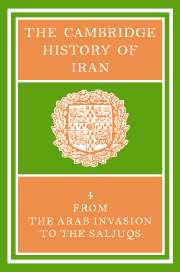Book contents
- Frontmatter
- 1 THE ARAB CONQUEST OF IRAN AND ITS AFTERMATH
- 2 THE ‘ABBĀSID CALIPHATE IN IRAN
- 3 THE ṬĀHIRIDS AND ṢAFFĀRIDS
- 4 The SĀMĀNIDS
- 5 THE EARLY GHAZNAVIDS
- 6 THE MINOR DYNASTIES OF NORTHERN IRAN
- 7 IRAN UNDER THE BŪYIDS
- 8 TRIBES, CITIES AND SOCIAL ORGANIZATION
- 9 THE VISUAL ARTS
- 10 NUMISMATICS
- 11 THE EXACT SCIENCES
- 12 LIFE SCIENCES, ALCHEMY AND MEDICINE
- 13(a) PHILOSOPHY AND COSMOLOGY
- (b) SŪFISM
- 14 THE RELIGIOUS SCIENCES
- 15 SECTS AND HERESIES
- 16 NĀSIR-I KHUSRAU AND IRANIAN ISMĀ‘ĪLĪSM
- 17 ZOROASTRIAN LITERATURE AFTER THE MUSLIM CONQUEST
- 18 ARABIC LITERATURE IN IRAN
- 19 THE RISE OF THE NEW PERSIAN LANGUAGE
- 20 (a) THE “RUBĀ'Ī” IN EARLY PERSIAN LITERATURE
- (b) ‘UMAR KHAYYĀM: ASTRONOMER, MATHEMATICIAN AND POET
- Bibliography
- Index
- Plate section
- Plate section">
- Map 1. Iran under the Abbasids">
- References
14 - THE RELIGIOUS SCIENCES
Published online by Cambridge University Press: 28 March 2008
- Frontmatter
- 1 THE ARAB CONQUEST OF IRAN AND ITS AFTERMATH
- 2 THE ‘ABBĀSID CALIPHATE IN IRAN
- 3 THE ṬĀHIRIDS AND ṢAFFĀRIDS
- 4 The SĀMĀNIDS
- 5 THE EARLY GHAZNAVIDS
- 6 THE MINOR DYNASTIES OF NORTHERN IRAN
- 7 IRAN UNDER THE BŪYIDS
- 8 TRIBES, CITIES AND SOCIAL ORGANIZATION
- 9 THE VISUAL ARTS
- 10 NUMISMATICS
- 11 THE EXACT SCIENCES
- 12 LIFE SCIENCES, ALCHEMY AND MEDICINE
- 13(a) PHILOSOPHY AND COSMOLOGY
- (b) SŪFISM
- 14 THE RELIGIOUS SCIENCES
- 15 SECTS AND HERESIES
- 16 NĀSIR-I KHUSRAU AND IRANIAN ISMĀ‘ĪLĪSM
- 17 ZOROASTRIAN LITERATURE AFTER THE MUSLIM CONQUEST
- 18 ARABIC LITERATURE IN IRAN
- 19 THE RISE OF THE NEW PERSIAN LANGUAGE
- 20 (a) THE “RUBĀ'Ī” IN EARLY PERSIAN LITERATURE
- (b) ‘UMAR KHAYYĀM: ASTRONOMER, MATHEMATICIAN AND POET
- Bibliography
- Index
- Plate section
- Plate section">
- Map 1. Iran under the Abbasids">
- References
Summary
THE ISLAMIZATION OF IRAN
There is a strange persistence in many Western studies of the religious history of Islamic Iran to be concerned almost solely with small sects and extremist religious movements. Far too little attention has been paid to the contribution of Iran to the mainstream of Islam and its traditional sciences, whether these be Sunnī or Shī‘ī. To be sure the religious climate of Iran has been witness throughout Islamic history to the rise of many sects, some of which were on the fringe of the spectrum of Islam and a few even outside of it, especially during the first few centuries of the Islamic period. But such movements as that of Bābak Khurramdīn, for example, are minor rivulets on the margin of a vast river which was a major source feeding the sea of knowledge identified with classical, orthodox Islam. Without a clear understanding of the role of Iranian scholars in the cultivation of the basic Islamic sciences, such as Qur'anic commentary (tafsīr), tradition (hadīth), jurisprudence (fiqh) and its principles (usūl al-fiqh) and theology (kalām), the meaning of the Islamization of Iran on the one hand and Iran's rôle in the elaboration of Islam and its civilization on the other can never be fully understood.
Those who speak of the military conquest of Iran by the Arab armies as being synonymous with the Islamization of the country can perhaps present in support of their thesis arguments claiming that the newly converted Persians performed public prayers because of what might be termed “public pressure”. But they would find it difficult to explain why the Persians produced so many great Islamic scholars.
- Type
- Chapter
- Information
- The Cambridge History of Iran , pp. 464 - 480Publisher: Cambridge University PressPrint publication year: 1975

